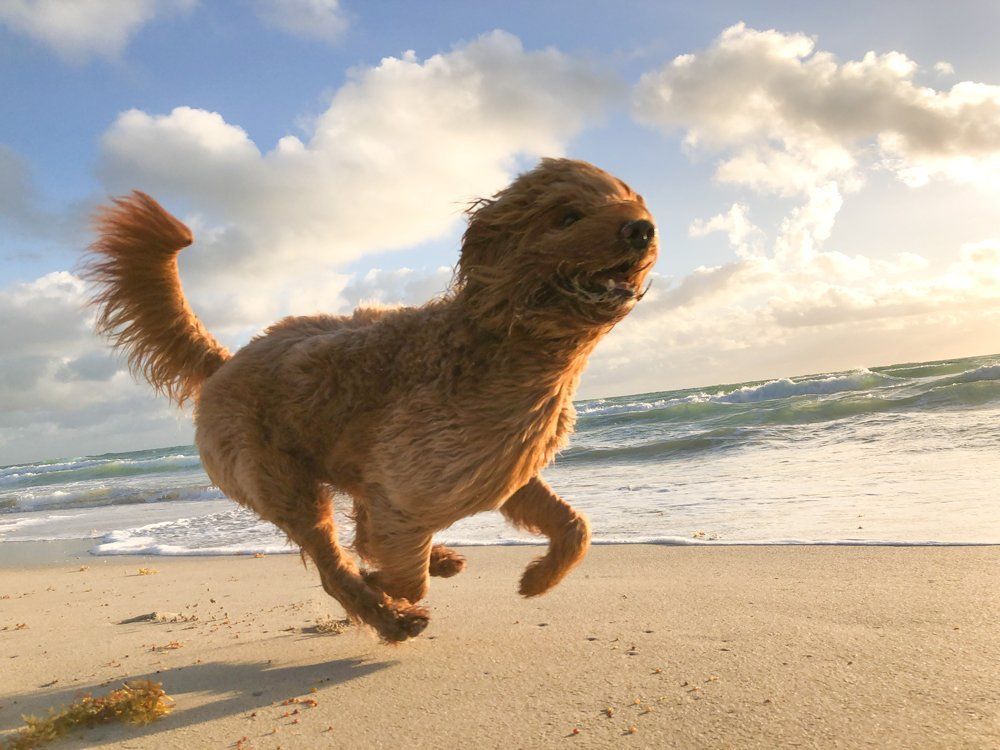5 Tips to Help Keep Your Pup Safe on a Beach Day
5 December 2019

There are a number of beaches in and around Vero Beach, Florida that allow leashed dogs to enjoy the sand and water. If you want to enjoy a beach day with your pup, research what hazards your dog may face and then prepare for your outing. Here are five tips to ensure that your dog stays safe on their beach adventure.
1. Limit the Amount of Sun and Heat Exposure Your Dog Gets
Too much sun and heat exposure can cause heatstroke in a dog. If you are taking your furry friend to the beach, limit the amount of sun and heat exposure that they get and ensure they that have access to shade. Minimize the amount of time you spend at the beach during the hottest part of the day, and avoid playing catch or fetch when the sun beats down.
Signs of heatstroke in a dog include panting, excessive drooling, agitation, and increased heart rate. If your dog exhibits any of these signs, get them out of the heat and into a cool environment. If their symptoms do not get better, or they begin to have problems breathing, begin to vomit or have diarrhea, they should be evaluated by a vet.
2. Do Not Allow Your Pet to Drink Saltwater
When your dog is near the water, they may be tempted to drink salt water. While a small amount of saltwater will not harm them, a large amount can cause them to become dehydrated and ill. Always ensure that you have plenty of water for your dog to drink at all times, and try to distract or deter them if you see them drinking too much salt water.
Changes to your dog's gums and saliva, as well as difficulty walking and vomiting, can be indicative of severe dehydration. If you notice these signs after your dog has consumed a large amount of saltwater, you should bring them to a vet.
3. Protect Your Dog
With
Sunscreen
Just as humans can burn from sun exposure, so can dogs. If you have a short-haired breed of dog, or if your dog has recently had a short haircut, you will want to coat their skin in an even layer of sunscreen that is specially formulated for dogs. Human sunscreen has substances, such as zinc, that can be harmful to dogs, so always look for dog-formulated brands.
4. Be on the Lookout for Hazards
When you are at the beach, you may be relaxing. If you bring your pet with you, however, you also need to pay attention to your pet's surroundings and be on the lookout for hazards. Some of the hazards to dogs that may be present at a beach include:
- Hot sand
- Glass
- Cigarette butts or other trash
- Choppy water or rip tides
- Other dogs
- Small children
- Fishing hooks
- Coral and jagged shells
Be aware of these hazards so you can identify things that can harm your pet and steer clear of them.
5. Rinse Your Dog
With
Clean Water at the End of the Day
After you are done at the beach for the day, rinse your dog with clean water. Leftover sand can cause your dog's skin to become itchy and dry. It can also lead to rashes and hot spots. Saltwater can also be drying in your dog's hair, which will get stiff and itchy. Rinsing will remove sand and saltwater as well as any germs and bacteria that may be on your pup's skin or fur.
Despite your best efforts, you cannot safeguard your dog from every danger at the beach. If your dog sustains an injury at the beach or acts ill after a fun day in the sun, Pet Medical Center of Vero Beach can diagnose and treat your pet.
Contact us
to schedule an appointment or let us know that you need to bring your dog in for after-hours emergency care.
If left untreated, roundworms and hookworms can cause serious health problems for your pet. Read about the signs in this blog and how to take action.
Many pet owners overlook the importance of dental health in their pets. Read this blog to learn why dental health is so important for your animal companion.
Your beloved pets, whether our loyal canines or our independent felines, play an integral role in your life. Read on to learn how to manage their stress.
Dogs can suffer from a plethora of digestive issues. But how can you tell if your pup has any digestive issues? Discover some key signs to look out for.
A tick’s bite can spread deadly diseases to you and your pet. Learn about a few tick-borne conditions your pet may contract if they spend time outside.
Has your animal's hair changed? Discover what this might mean and if your best friend might need treatment for their potential problem.
Prepare your puppy for its first vet visit to avoid challenges during a medical examination. This post highlights five ways to help your puppy.
If your dog is pregnant, you might feel unprepared. Read this blog to learn everything you should know about canine pregnancy, labor, and delivery.
A surgery is an invasive procedure that requires preparation to ease your cat and ensure a smooth recovery. Discover tips to prepare your cat for surgery.
Just like humans, pets can face various health issues. Learn about the most common conditions that pets face and how to avoid and treat them.





